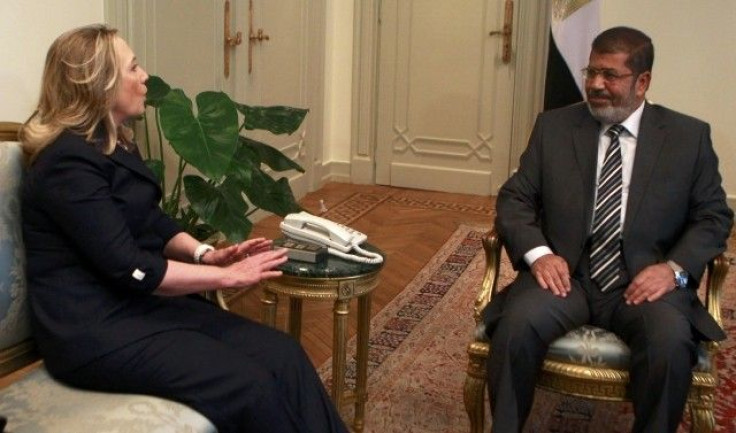Clinton Arrives In Israel; Talks To Focus On Egypt, Iran And Palestine

The U.S. Secretary of State Hillary Clinton arrived in Israel late Sunday for high-level talks with Israeli officials. The talks will focus on the course of political action in Egypt, Iran's alleged clandestine nuclear program and the stalled Israeli-Palestinian peace process.
On her first visit to the Jewish state in nearly two years, which came at the tail end of an eight-nation tour spanning Europe, Asia and the Middle East, Clinton will hold talks with the Israeli Prime Minister Benjamin Netanyahu, President Shimon Peres, Foreign Minister Avigdor Lieberman and Defense Minister Ehud Barak.
At the top of Clinton's agenda of discussions with Israeli officials will be her assessment of Egypt's new President and the country's bumpy political transition, following the ouster of Hosni Mubarak, which remains of critical importance to Israel and the U.S.
A statement from the Israeli president's office said that Clinton's meeting with Peres would focus on Israel's relations with Cairo and would also touch on the peace process with the Palestinians and the Iranian nuclear program.
During her visit to Egypt, Clinton urged President Mohamed Morsi to start a dialogue with military leaders as a way of preserving the country's transition to democracy. She said the U.S. was doing all it could to support the democratically elected government and to help make it a success in delivering results for the people of Egypt.
The meeting at the Egyptian presidential palace was aimed at stabilizing Washington's relations with Cairo, which remained stable during Mubarak's regime. Morsi refrained from shaking hands with Clinton in front of the reporters, which is widely attributed to his Muslim faith. But he reportedly shook hands with Clinton and the entire U.S. delegation behind closed doors and said in English: We are very, very keen to meet you and happy that you are here.
President Obama, who spoke over the phone with Morsi following his win last month, has pledged to work with the Egyptian elected government on the basis of mutual respect.
The Arab Spring will form a part of the discussions in Israel which, by leading to Mubarak's fall in Egypt and a longstanding violent crisis in Syria, has deemed two of Israel's borders unstable.
Clinton will also meet the Palestinian Prime Minister Salam Fayyad but not President Mahmoud Abbas, who she met in Paris on July 6.
The U.S.-backed peace talks between Israel and Palestine were stymied after Netanyahu rejected Palestinian demands that he extend a partial freeze on settlement construction that was put in place at Washington's request.
Following her talks with Abbas, on the sidelines of a Friends of Syria Summit in Paris earlier this month, Clinton said they discussed how to build on his exchange of letters with the Israeli Prime Minister Benjamin Netanyahu.
I underscored that the United States remains absolutely committed to the goal of a comprehensive peace in the Middle East based on two states with two peoples based on peace and security, Clinton told the reporters.
At a time of upheaval across the region we cannot lose sight of the critical importance of resolving this issue, she said.
Abbas had asked Clinton to press Israel for the release of the Palestinian prisoners, especially those held since before the 1993 Oslo Accords, the AFP reported.
The Palestinian officials have said that the negotiations can be resumed only if Israel freezes settlement construction in the occupied West Bank and east Jerusalem.
© Copyright IBTimes 2024. All rights reserved.












